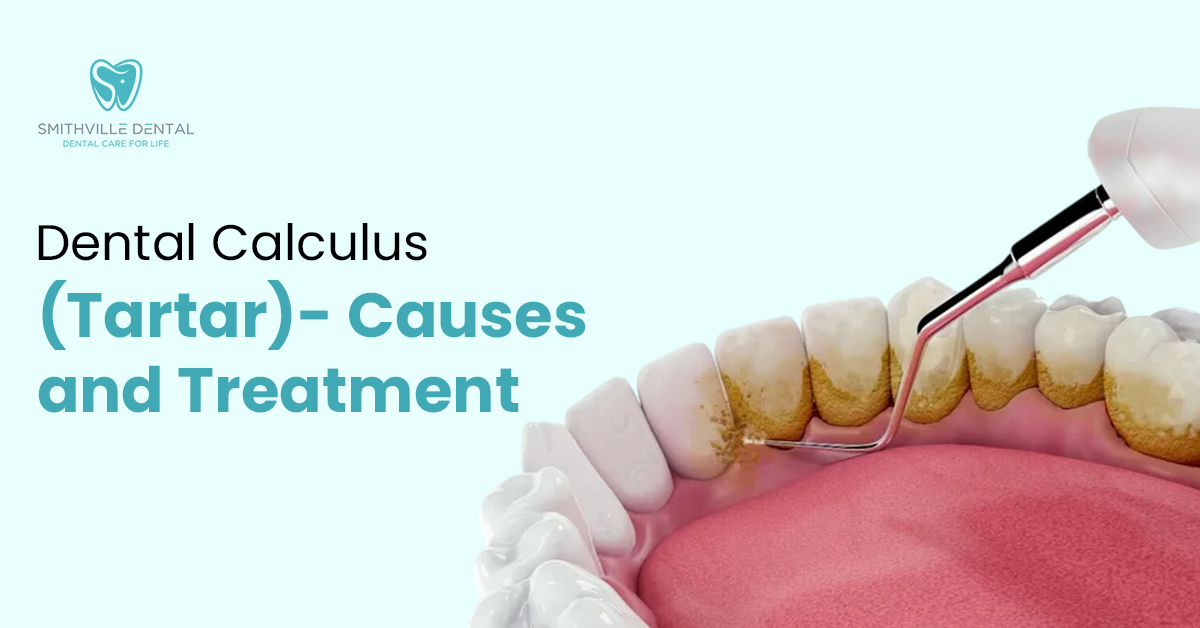Understanding the causes and treatment options for dental calculus is crucial for maintaining a healthy mouth. For those seeking professional care, a Dental Clinic in Smithville, TX can provide expert diagnosis, prevention and treatment. Dental calculus, also known as tartar, is a hardened deposit that forms on the teeth and along the gumline.
Unlike soft plaque, which can be removed with regular brushing and flossing, tartar is mineralized and firmly attached to the tooth surface. If left untreated, dental calculus can lead to a variety of oral health issues, most notably Gum Disease.
What is Dental Calculus (Tartar)?
Plaque, a sticky layer of bacteria, builds up on teeth over time and causes dental calculus. If the plaque is not completely eliminated, it will solidify into tartar as minerals from the saliva mix with the plaque. Without expert dental assistance, this procedure can be challenging to eradicate because it can happen above as well as below the gum line.
Causes of Dental Calculus
Bad Dental Care
Plaque builds up and finally turns into tartar due to inadequate brushing and flossing. The best defense against calculus development, is regular dental cleanliness.
A Diet Heavy in Carbohydrates and Sugars
Consuming sugary and starchy foods frequently feeds oral bacteria, which speeds up plaque accumulation and raises the risk of tartar formation.
Tobacco Use and Smoking
Tartar accumulation is more common in tobacco users. Tobacco’s compounds have the ability to change the oral environment, which facilitates the formation of plaque.
Parched Mouth
Saliva neutralizes acids and helps wash away food particles. Faster tartar formation may result from decreased salivary flow brought on by certain drugs or illnesses.
Genetics and Age
The risk of tartar accumulation rises with age, and some people are genetically susceptible to it.
Treatment of Dental Calculus
Expert Dental Cleaning
Professional cleaning at a Dental Clinic in Smithville, TX is the most efficient method of removing tartar. Tartar above and below the gum line is removed by dentists and dental hygienists using specialized instruments. To prevent tartar, regular cleanings are advised, usually every six months.
Root Planning and Scaling
Patients who exhibit early indications of Gum Disease or substantial tartar accumulation may require root planning and scaling, which is a deep cleaning technique. To assist the gums in reattaching to the teeth, this entails smoothing the roots and eliminating tartar from the tooth surfaces.
Better Dental Health
It is essential to maintain proper oral hygiene following professional cleaning. Plaque can be kept from solidifying into tartar, by brushing twice a day with fluoride toothpaste, flossing every day and using an antimicrobial mouthwash.
Modifications to Lifestyle
Gum Disease and accumulation of tartar can be prevented by quitting smoking, drinking plenty of water and maintaining a healthy, low sugar diet.
Conclusion
Dental calculus is a common but preventable dental problem that, if left untreated, can result in serious complications like Gum Disease. Professional cleanings, consistent home care and routine dental visits, are necessary to keep tartar under control.

 Book Appointment
Book Appointment